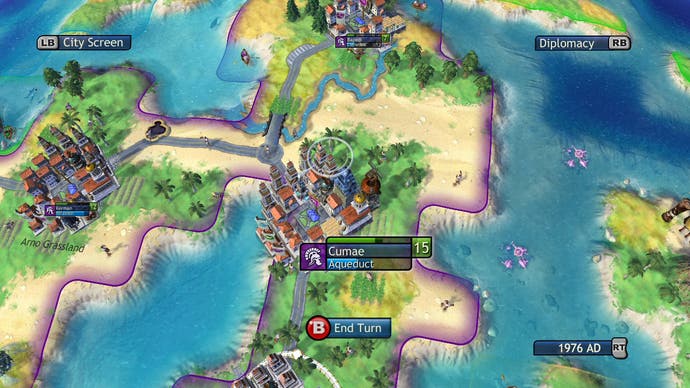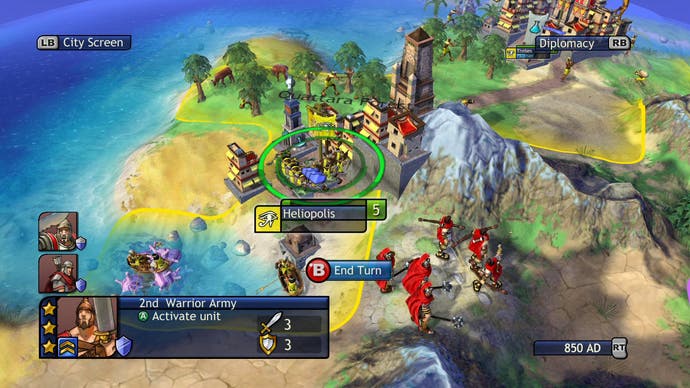Sid Meier's Civilization Revolution
Every generation needs a new Civilization.
There's a fundamental difference between Civ Rev and Civ Trad, a subtle shift in thinking that makes two superficially identical games entirely separate creatures. Civ Trad is a videogame, with all the complexities and variance that often entails. Civ Rev is a board game, with all the self-contained simplicity that often entails. Yes, there are fixed, unwavering rules in Civ Trad, but it's this grand, elaborate affair designed for multiple sittings, and one in which there's this sense that the world is really turning, its people edging towards an uncertain future. In Civ Rev, the fourth wall comes down. With the victory conditions that much simpler and more easily-attained, every player - even the ones with robot brains - knows they're in a game, knows exactly what they're striving for, and knows exactly how to strive for it. You'll decide on a course of action - victory by conquest, by cash, by culture or by technology - and will doggedly turn your handful of cities towards achieving it. Within two hours, often far less, it'll all be over bar the shouting. There will, I suspect, be a lot of shouting. It's one of those games that's really made for lengthy, enthusiastic post-match analysis. The screen will dim, but you'll sit there with your headset still on, jabbering for a half hour about how you had an Artillery army just down the road, how three more turns would have built you a nuke...

To this end, the game map is a smaller place you can cross in just a few turns, there are fewer unit types (it tops out at tanks and bomber planes), far fewer technologies (researching Bronze Working enables you to build archers, harvest fish and construct the Colossus of Rhodes. Erm) and diplomacy is a slim, relatively optional affair. Success doesn't come from trading spice with Russia for wine, but simply from war and peace. In fact, it's possible to go an entire game without engaging in any diplomacy at all, bar when another Civ begs, bribes or threatens you. If you want to just build a big army and go kill stuff, you can. On the other hand, it's a lot trickier to keep your head down and concentrate on, say, a cultural victory - the AI Civs browbeat you with increasingly unfair demands, eventually forcing you to either hand over something impossibly precious or suffer their wrath. It's a little artificial, but it's a reflection of the game's philosophy - constant event, constant involvement, rather than browsing statistics screens or repeat-clicking End Turn while you wait for something to happen.
Similarly, each and every fight feels like an epochal event. When an Elite Rifleman army falls, where once you'd tut, now you'll howl. That "Elite" label references the unit's veterancy, incidentally - a key element of combat. Three and then six victories see the unit upgraded, adding to its overall clout and, on the sixth, adding a special ability. On top of that, you can - and should - stack units in groups of three. This is the only way to attack (or defend) with more than a single unit at once, and thus is absolutely vital to success. On the downside , it means that losing a fight costs you three units in one fell swoop - a truly harrowing occurrence, unless by that stage of the game you're Captain Richy Rich of Richtown, Richonia, born on the first of Rich, Nineteen-Richty-Rich.

Civ Rev is going to annoy a lot of people. On my first encounter with it, I was convinced its sheer charm and concentrated focus on what always made Civ great would win over all but the hardest Civ IV-playing hearts, but after a dozen or so games I now worry the enormity of what's been composited and removed may make it an unsatisfying single-player game to old hands. What it will be, I suspect, is a much better multiplayer game - with the goals that much clearer and more attainable, the sense of competition increases enormously. It's not a game of minute adjustments, but of major shifts - every city, every building, every unit, every unit upgrade matters so very much. What's remarkably clear throughout is that it really is not a sequel to Civilization IV - it's very much off doing its own thing, with no intention of replacing its bigger-boned PC brother. A revolution? Perhaps not. It is, however, exceptionally brave.
Sid Meier's Civilization Revolution is due out on PS3 and 360 on 13th June.










